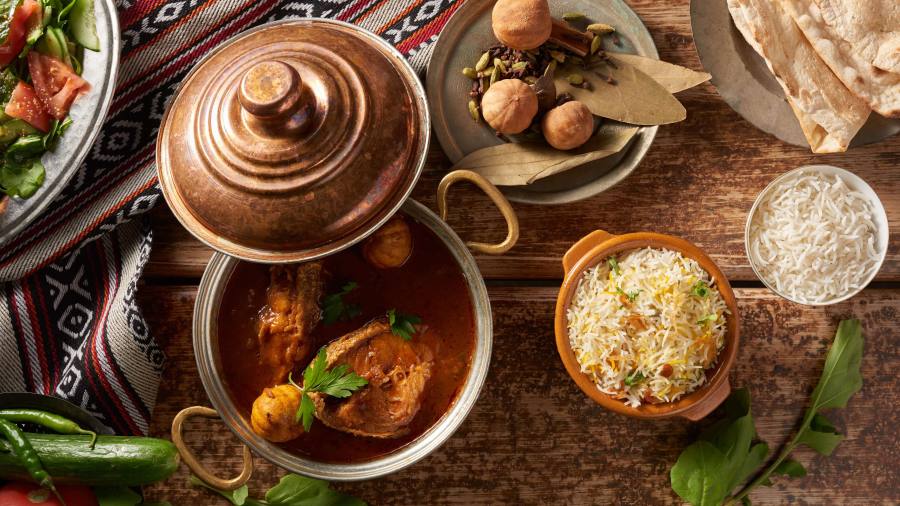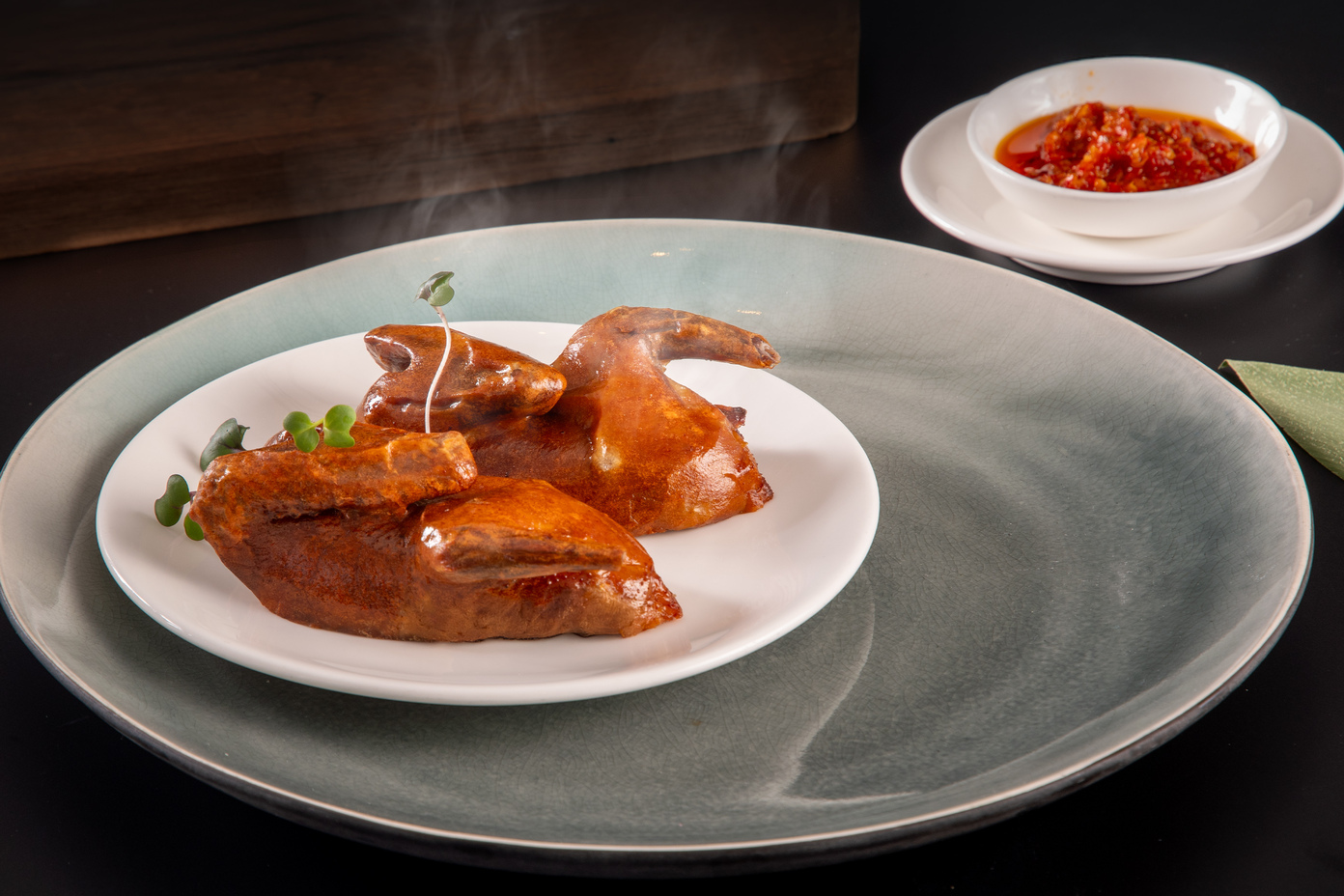Flavorful Indian
Biryani
Biryani, a culinary masterpiece, has its roots deeply embedded in the rich tapestry of South Asian cuisine. This aromatic one-pot dish has transcended borders, captivating food lovers worldwide with its complex flavors and comforting warmth. It's a harmonious blend of fragrant rice, tender meat or vegetables, and a carefully curated mix of spices.
Chef's Notes:
- Biryani is a sumptuous rice dish that combines aromatic grains, succulent meat, and a blend of exotic spices.
- The secret to a perfect biryani lies in the careful layering of ingredients and the slow cooking process.
- While traditionally made with meat, biryani can be adapted for vegetarians or customized with various proteins to suit different tastes.
The Essence of Biryani
The magic of biryani lies in its perfect balance of ingredients, each contributing to a symphony of flavors. At its core is the rice – long-grain basmati, known for its delicate aroma and fluffy texture. This forms the canvas upon which the other flavors are painted.
The protein, be it chicken, lamb, or fish, is typically marinated in a spice-infused yogurt mixture. This process not only imparts flavor but also ensures the meat remains juicy and tender. The addition of fried onions, fresh herbs, and sometimes nuts or dried fruits, creates layers of texture and taste that make each bite an adventure.
Ingredients for Your Biryani
For the marinade:
- 1 kg chicken, cut into generous pieces
- 1 cup thick yogurt
- 2 tbsp freshly made ginger-garlic paste
- 1 tbsp aromatic biryani masala
- 1 tsp golden turmeric powder
- 1 tsp vibrant red chili powder
- Salt to enhance flavors
For the fragrant rice:
- 2 cups aged basmati rice
- 4 aromatic green cardamom pods
- 4 pungent cloves
- 1 stick of fragrant cinnamon
- 1 aromatic bay leaf
- Salt to taste
For the flavorful layers:
- 2 large onions, sliced thin and fried to a golden crisp
- 1/4 cup fresh mint leaves, roughly chopped
- 1/4 cup coriander leaves, finely chopped
- 2 tbsp pure ghee
- A pinch of precious saffron, soaked in 2 tbsp warm milk
Crafting Your Biryani
1. Marinate with care: Combine all marinade ingredients, coating the chicken thoroughly. Allow flavors to meld for at least 2 hours, preferably overnight.
2. Prepare the rice: Rinse the rice until the water runs clear, then soak for 30 minutes to ensure even cooking.
3. Par-cook the grains: In a large pot, bring water to a rolling boil with whole spices and salt. Add rice and cook until just shy of al dente. Drain and set aside.
4. Tend to the chicken: In a heavy-bottomed pot, cook the marinated chicken on medium heat until nearly done.
5. Layer with precision: Begin with a layer of chicken, followed by a generous layer of rice. Sprinkle with crispy onions, fresh herbs, and a drizzle of saffron-infused milk. Repeat to create multiple layers.
6. The dum process: Seal the pot tightly with foil and a snug-fitting lid. Allow to cook on low heat, undisturbed, for 20-25 minutes.
7. Patience is key: After cooking, let the biryani rest for 10 minutes to allow the flavors to settle.
8. Serve with flair: Gently mix the layers and serve hot, accompanied by cooling raita or spicy salan.
The Technique of Layering
The layering technique is what elevates biryani from a simple rice dish to a culinary masterpiece. This method allows each component to retain its integrity while melding into a cohesive whole. The bottom layer of meat bastes in its own juices, while the top layer of rice absorbs the rising aromatic steam.
When creating your layers, handle the rice with care to preserve its delicate grains. The golden fried onions provide a sweet crunch, while fresh herbs add a burst of freshness. The saffron-infused milk is the final touch, imparting a subtle hue and luxurious flavor to your biryani.
Exploring Biryani Variations
While chicken biryani holds a special place in many hearts, the world of biryani is vast and varied. Vegetable biryani offers a delightful alternative, bursting with the goodness of seasonal produce. For a more indulgent experience, lamb or goat biryani provides rich, complex flavors.
Some regional variations incorporate sweet elements like raisins or dried apricots for a delightful contrast. Others crown their biryani with boiled eggs for added protein. The beauty of biryani lies in its adaptability – feel free to experiment and create your signature version!
Complementing Your Biryani
Though biryani is a complete meal in itself, it's often accompanied by side dishes that enhance the dining experience. A cool, creamy raita helps balance the spices, while a tangy mirchi ka salan adds an extra layer of flavor. A simple salad of crisp onions and cool cucumbers can provide a refreshing contrast to the rich biryani.
Nutrition Facts
Nutrient amount per serving:
-
- Calories: 450
- Protein: 25g
- Carbohydrates: 55g
- Fat: 18g
- Fiber: 3g
- Sodium: 600mg
FAQs
How can I elevate the flavors in my biryani?
The secret to a flavor-packed biryani lies in using high-quality, fresh spices and allowing ample marination time. Opt for whole spices when possible, and let your meat marinate for at least 2 hours, ideally overnight. The dum cooking process is crucial – it allows the flavors to meld and intensify, resulting in a more complex taste.
Is it possible to prepare biryani ahead of time?
Absolutely! In fact, many biryani enthusiasts swear that it tastes even better the next day. The flavors have more time to develop and meld together. When reheating, do so gently and add a splash of water if needed to maintain moisture.
What's the secret to perfectly cooked rice in biryani?
The key is to par-cook the rice before layering. It should be about 70% cooked – still firm to the bite. Using high-quality aged basmati rice is also crucial, as it maintains its structure better during the cooking process.
Is biryani typically a spicy dish?
The spice level in biryani can vary greatly depending on the recipe and personal preference. Traditional biryani is more about complex flavors than heat. You can easily adjust the spice level by modifying the amount of chili powder or fresh green chilies used.
Can biryani be frozen for later consumption?
Yes, biryani freezes quite well. Allow it to cool completely, then portion it into airtight containers. It can be frozen for up to 3 months. When ready to eat, thaw in the refrigerator overnight and reheat thoroughly before serving.





























 Must Try Foods
Must Try Foods
 Gastronomy Cities
Gastronomy Cities
 Chef's Talk
Chef's Talk